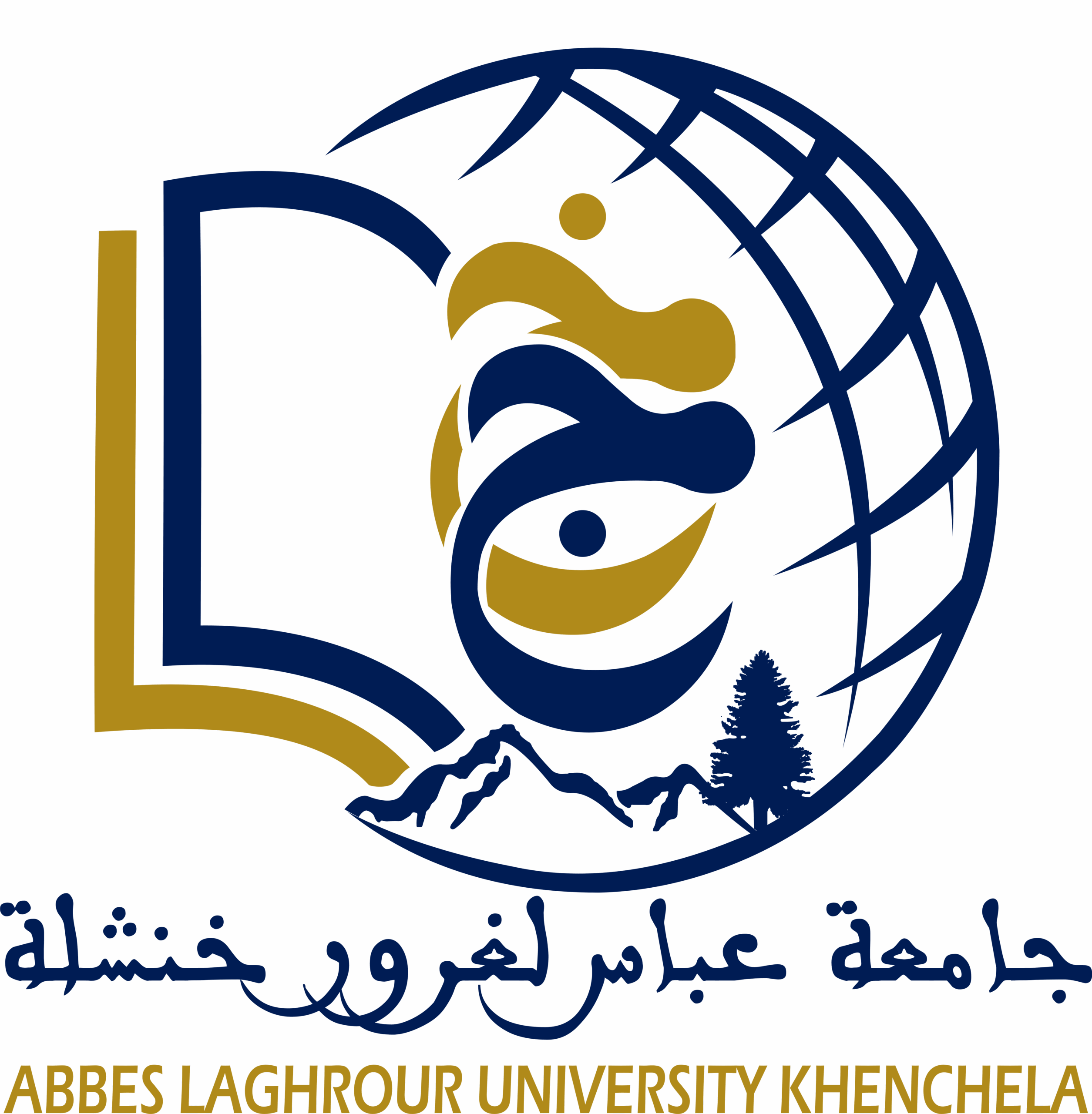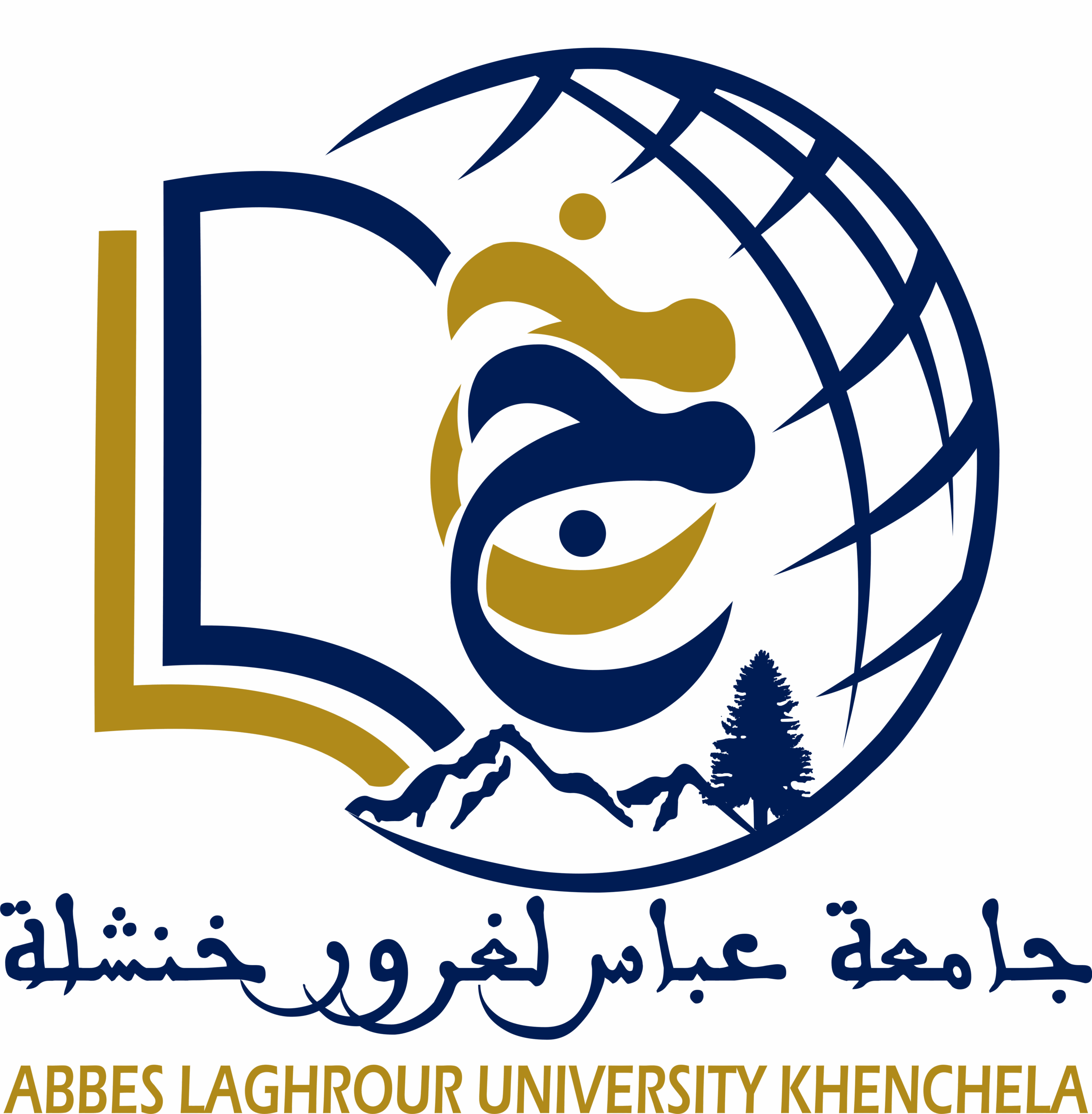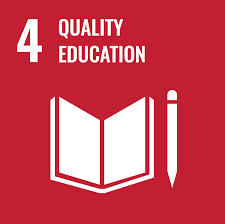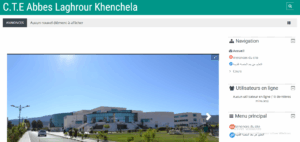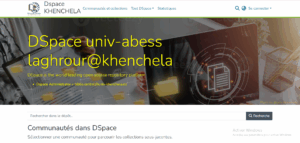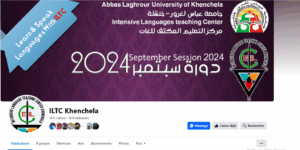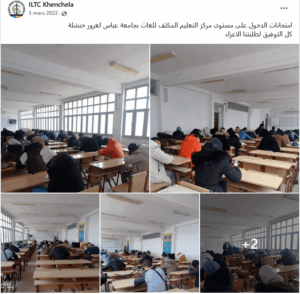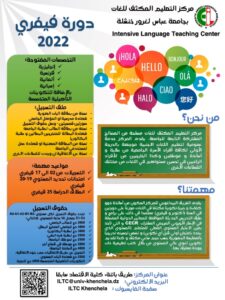04-03-01
University Abbas Laghrour Khenchela is not just an educational institution that focuses solely on its enrolled students. Instead, the university makes great efforts to open its doors wide to the local community and share its rich educational resources with them. Through initiatives such as Moodle, DSpace, and the Intensive Education Center, the university aims to support lifelong learning and promote community development in the region. This report will highlight these outstanding efforts of the university in serving the community.
Moodle: http://elearning.univ-khenchela.dz/moodle/
- The university uses the Moodle platform to manage online education.
- Moodle allows people from outside the university to enroll in some open courses and access educational materials.
- This allows members of the community to view video lectures, assignments, and group discussions without the need for formal enrollment in the program.
- DSpace: http://dspace.univ-khenchela.dz:4000/home
- This is the digital repository system used by the university to preserve and provide access to academic research and publications.
- The general public can access and review these research contents without a subscription.
- This allows the community to stay informed on the latest research and knowledge produced by the university.
- Intensive Education Center: https://www.facebook.com/ILTCUK
- This center offers diverse short courses and training programs for the general public.
- These courses cover subjects in information technology, languages, and professional skills.
- Individuals from outside the university benefit from these training opportunities at low or no cost.
- WebTV: https://webtv.univ-khenchela.com/
- The university operates a WebTV platform that provides free access to recorded lectures and educational videos.
- Members of the public can view these materials on-demand to supplement their learning and professional development.
- The WebTV library covers a wide range of subjects, including the university’s academic programs as well as special public lectures and seminars.
It is clear that University Abbas Laghrour Khenchela does not merely provide higher education to its enrolled students, but also
strives to be a beacon of knowledge and training for the local community as a whole. By offering free access to learning resources through digital platforms and training centers, the university affirms its commitment to disseminating knowledge and empowering individuals across the region. This comprehensive and balanced approach to education and community development makes Université Abbas Laghrour Khenchela a leading institution in the area.
04-03-02
University Abbas Laghrour Khenchela hosts public events open to the general public on its campus:
In addition to the digital initiatives mentioned earlier, the university organizes public lectures and community educational events on the university premises.
For example, the Intensive Education Center at University Abbas Laghrour Khenchela has announced the opening of enrollment for diverse language courses in December 2022. These courses will include English, French, German, Italian, Chinese, and Spanish. Additionally, courses in computer science and software programming will be provided.
This training program will run from Sunday, November 20th to December 21st, 2022, and is available to the general public at a reasonable cost or free of charge.
These community events and training courses organized by University Abbes Laghrour Khenchela reinforce its commitment to serving and developing the local community by making knowledge and skills accessible and available to all in an open and facilitative manner.
04-03-03
University Abbas Laghrour Khenchela offers a number of open-enrollment public educational programs:
- Executive Education Programs:
- We provide a variety of short courses and seminars in areas such as leadership, management, marketing, and technology. These programs are targeted at working professionals who wish to develop their skills and expertise.
- The duration of these programs ranges from one week to two months, and they are held on weekends or during regular business hours to accommodate the schedules of participants.
- These programs are delivered by our university faculty as well as industry and community experts.
- Professional Programs:
- We offer a range of professional training programs in fields such as information technology, engineering, and healthcare.
- These programs are geared towards specialists seeking to update their skills or obtain professional certifications.
- The duration of these programs ranges from one week to six months, depending on the scope of the content and the target certifications.
- These programs are designed in collaboration with the relevant professional bodies to ensure they meet industry needs.
For more details on these programs and course schedules, please visit our university website or contact the Center for Continuing Education.
04-03-04
University Abbas Laghrour Khenchela carries out educational outreach activities beyond the university campus, in the local community.
The university’s Liaison Committee with Secondary Schools regularly organizes visits for school students to introduce them to the academic programs and opportunities available at the university. These visits allow students to gain early exposure to higher education and spark their interest.
In addition to these school-based programs, the university also hosts public lectures, workshops, and interactive demonstrations specifically designed for the general public. These educational activities aim to share knowledge and expertise, and to generate interest in the various academic fields.
Some of these community education programs are even managed by volunteer students from the university itself, which further enhances their involvement in serving the local community.
In these ways, University Abbas Laghrour Khenchela seeks to engage and reach out to the surrounding community, rather than limiting itself to the confines of the university campus.
The University of Abbas Laghrour in Khenchela showcases its progress in the field of education through various research activities and academic initiatives.
A. PRFU Research Projects
Studies on Higher Education Quality:
These studies focus on evaluating academic standards in educational institutions by analyzing the learning environment, student satisfaction, and the alignment of academic programs with market needs. The aim of this research is to provide practical recommendations for improving education quality and enhancing academic performance.
Curriculum Development Research:
This research seeks to review current educational curricula and propose updates that align with the latest educational trends. The studies include content analysis and teaching methods, contributing to the enhancement of educational effectiveness and preparing students for the demands of the modern era.
Projects to Improve Modern Teaching Methods:
These projects focus on the use of innovative teaching methods such as active learning, project-based learning, and e-learning techniques. This research aims to evaluate the impact of these methods on student achievement and support self-directed learning, contributing to the creation of an interactive educational environment.
Among these is the research project on the House of Entrepreneurship and support for the fourth Sustainable Development Goal. The research project titled “The University and Mechanisms for Activating the House of Entrepreneurship According to Labor Market Requirements” aims to enhance quality education and develop university students’ skills in line with labor market needs, thereby supporting the fourth goal of the Sustainable Development Goals. The project focuses on revealing the reality of the House of Entrepreneurship in Khenchela and its role in community development by honing students’ skills and providing them with the necessary knowledge to adapt to economic and social changes. The project also seeks to activate cooperation mechanisms between the university and the community, which enhances investment opportunities in higher education and encourages the spirit of entrepreneurship. Through field studies and discussions of doctoral theses, the research aims to enhance scientific production and interaction with institutions supporting entrepreneurship projects, contributing to comprehensive sustainable development that benefits the local community and boosts the national economy.
B. Faculty Publications
Articles in National Educational Journals:
Faculty members publish their research in local educational journals, which enhances the exchange of knowledge and experiences among academics. These articles address various educational issues and highlight successful experiences in improving education quality.
International Studies on Education Development:
These studies involve comparisons between educational systems in different countries, providing insights into best practices and innovations in the field of education. The aim of this research is to benefit from international experiences and apply them in the local context. The University of Abbas Laghrour in Khenchela seeks to enhance education quality by adopting a variety of modern teaching methods that align with global trends. These methods include:
- Blended Learning: Combines traditional education with e-learning, giving students the ability to control the time and place of their learning.
- Project-Based Learning: Encourages students to work in groups or individually to solve real problems, with assessments based on project outcomes.
- Interactive Teaching: Focuses on engaging students in the educational process through discussions and interactive tools, promoting active participation.
- Game-Based Learning: Uses gaming techniques to motivate students and make the learning process more enjoyable through earning points or rewards.
- Flipped Learning: Students learn essential concepts at home, while class time is dedicated to interactive activities and discussions.
- Collaborative Learning: Promotes cooperation among students through group work, contributing to the development of communication and teamwork skills.
- Critical Thinking-Based Learning: Aims to enhance analytical and problem-solving skills through discussions and case studies.
- Experiential Learning: Provides hands-on experiences for students, such as field training, improving their theoretical understanding.
- Use of Advanced Technology: Includes techniques such as virtual reality and augmented reality to enhance the learning experience.
- Problem-Based Learning: Focuses on presenting real challenges to students, requiring them to utilize research and analytical skills.
Through these methods, the university contributes to developing students’ skills and preparing them for the demands of the job market, enhancing their ability to face future challenges.
Research Papers on E-Learning:
These papers focus on evaluating the effectiveness of e-learning as an alternative to traditional education, especially in light of current global conditions. The research addresses challenges and opportunities related to distance education and how to improve the online learning experience. Among these are articles by faculty members of the University of Abbas Laghrour in Khenchela on the topic of e-learning:
- “The Impact of E-Learning on University Student Achievement”: This article discusses how e-learning platforms affect student performance and academic outcomes.
- “E-Learning Strategies: Challenges and Opportunities”: This article reviews the strategies employed in e-learning and analyzes the challenges faced by educational institutions.
- “E-Learning During the Pandemic: Lessons Learned”: This article discusses how universities adapted to the rapid shift to e-learning during the COVID-19 crisis.
- “E-Learning Technologies: From Interactivity to Assessment”: This article examines the tools and techniques used in e-learning and how they can be utilized to enhance interaction among students.
- “The Role of E-Learning in Promoting Self-Directed Learning”: This article focuses on how e-learning supports students in developing self-directed and independent learning skills.
https://univ-khenchela.com/%D8%A7%D9%84%D8%AA%D8%B9%D9%84%D9%85-%D8%B9%D9%86-%D8%A8%D8%B9%D8%AF-23
Research Papers on E-Learning
These papers focus on evaluating the effectiveness of e-learning as an alternative to traditional education, especially in light of current global conditions. The research addresses the challenges and opportunities associated with distance education and how to improve the online learning experience. Among them are articles by faculty members of the University of Abbas Laghrour in Khenchela on the topic of e-learning:
- “The Impact of E-Learning on University Student Achievement”: This article discusses how e-learning platforms affect student performance and academic outcomes.
- “E-Learning Strategies: Challenges and Opportunities”: This article reviews the strategies used in e-learning and analyzes the challenges faced by educational institutions.
- “E-Learning During the Pandemic: Lessons Learned”: This article addresses how universities adapted to the rapid transition to e-learning during the COVID-19 crisis.
- “E-Learning Technologies: From Interactivity to Assessment”: This article examines the tools and techniques used in e-learning and how to utilize them to enhance interaction among students.
- “The Role of E-Learning in Promoting Self-Directed Learning”: This article focuses on how e-learning supports students in developing self-directed and independent learning skills.
https://www.asjp.cerist.dz/en/article/49842
C. Research Team Outputs
- Reports on Education Quality Indicators:
Research teams produce detailed reports that discuss quality indicators in education, such as graduation rates, exam results, and student satisfaction levels. These reports help evaluate academic performance and guide educational policies. Included is an article by Professors Tarek Tadrad and Walid Bakhouch titled “The Role of Educational Technologies in Achieving Quality in Higher Education from the Perspective of University Professors – A Field Study at the University of Abbas Laghrour Khenchela.” This scientific paper aimed to understand the extent to which the use of educational technologies—as a means for continuous improvement—contributes to achieving quality in education, based on several questions revolving around the relationship between educational technologies and quality systems. To achieve the study’s goals, a descriptive analytical method was applied on a sample of 170 professors from various departments of the University of Abbas Laghrour Khenchela during the academic year 2014-2015. The data for this study were collected using a questionnaire designed by the researchers, consisting of three sections. The results of the statistical analysis conducted using the “SPSS” software revealed a positive correlation between the use of educational technologies and quality, confirming their effectiveness as superior support methods employed in the continuous improvement of university performance, especially regarding the components of the educational process involving the professor, student, and academic knowledge.
https://www.asjp.cerist.dz/en/article/64628
· Evaluation studies of educational outcomes These studies involve evaluating the results of education in terms of the students’ ability to apply what they have learned in practical life. The research includes analysis of the outcomes of academic programs and the extent to which they are aligned with labor market requirements.
· Research in the field of academic development These research efforts aim to study how to improve the academic performance of both the faculty and the students. The research addresses strategies for the professional development of teachers and methods for enhancing the academic achievement of students.
This information is published through:
- The university’s official website: https://univ-khenchela.com
- The official Facebook page: https://www.facebook.com/?locale=fr_FR
- The YouTube channel: https://www.youtube.com/watch?reload=9&v=ZghffzdzpVI
The page dedicated to Goal 4 on the university’s Sustainable Development website: https://univ-khenchela.com/explore/articles.php?article=1870
